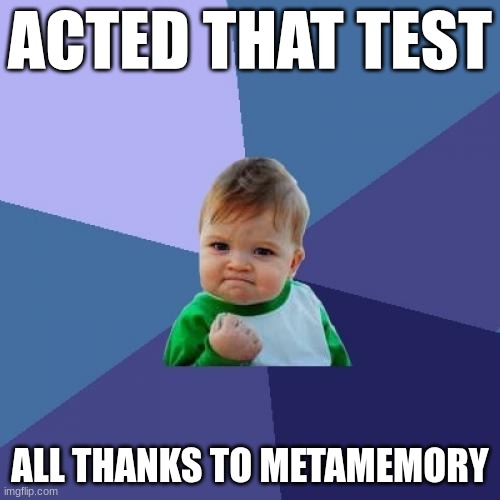By Bailey Poignant
Introduction
Studying for college exams can be stressful and scary especially when you do not know what to study, or how to know what information or material you should be reviewing. Not knowing what to study or how to study can cause students to not get the best results from reviewing, or completely avoiding it altogether because it does not help. When studying do you ever think back to see if you can recall the information? Knowing what you will be able to recall is known as metamemory. Using metamemory you can estimate how well you will be able to remember something, or judge how well you will be able to bring it forward when that information is needed. Maybe sometimes you have studied, and when you are given the exam you cannot quite pull the information forward that you know is in there somewhere. This is also metamemory.

What is Metamemory?
“Metamemory is defined as the knowledge and awareness of our own memory processes, including judgments of learning and tip-of-the-tongue states”.1 We are using metamemory when we recognize what we remember, how we learn new information, as well as the things we know we will forget. Oftentimes we are referencing metamemory without even knowing it. When you know you can remember faces, but struggle with recalling names, metamemory is being referenced. When we make comments about how good your memory is, or say you know you will be able to remember something you are referring to your metamemory.2 A part of metamemory is known as having something on the tip of your tongue. Maybe you know the definition of a term, but you can not quite remember the term or word for it. There is also a feeling of knowing where you think you know something, but you are unable to recall that specific information. This feeling of knowing the information you cannot recall is oftentimes able to be recognized if seen. We use metamemory to help shape how we learn and study in school. Metamemory influences how we study for exams, what techniques we utilize in and out of the classroom, and when choosing strategies that help us recall new information.3

How to Properly Use Metamemory
Metamemory is an essential tool to college success. When studying for an exam, study until you are able to recall the information. After studying, sit back and try to remember what you were just looking over. If you are able to recall the information chances are you will be able to pull that information when being asked about it. Being able to take full advantage of metamemory is a great studying trick. When you are listening to a lecture knowing what you need to take note of, or how well you need to take notes in class. Some classes you might be able to take notes in class, but knowing you also need to rewrite them after. Coming up with these strategies you will be using your metamemory to know what you need to do. This leads into the role of self-regulated learning. Self-regulated learning and metamemory go hand in hand.4 Knowing what you need extra help with, and then being self-regulated to put in the extra work. It is important to be honest with yourself when using metamemory.
Why you Should Use Metamemory
Memory affects us not only in the classroom, but in many aspects of human life.5 Metamemory helps us to know how much we need to study, or how well we know which aspects of the lesson need the most attention. Metamemory allows us to take control of our classroom abilities. When we know our memory we are able to build individualized learning strategies that give us control over our learning outcomes. Learning how to use metamemory can help you to learn the information, study the information more effectively, and then be able to recall that information when it needs to be applied.
Conclusion
After learning about metamemory I hope you are able to reflect on how you may already be using metamemory when studying or taking notes during a lecture. If not I hope you learned how you can now use metamemory to help with studying and learning in the future. Metamemory can be super helpful in and out of the classroom, and it can even cause less stress when you know how to determine what you need to study and how to study. With the help of metamemory you can focus on the material you do not know, and be able to customize your study techniques the way you see fit. Using Metamemory can make college exams less stressful and scary because you now do know what to study. It can give you a sense of control going into an exam rather than just winging it.
- Metamemory. (2017). Metamemory – an overview | ScienceDirect Topics. (n.d.). https://www.sciencedirect.com/topics/neuroscience/metamemory ↩︎
- Columbia. (2017). Metamemory: An Update of Critical Findings http://www.columbia.edu/cu/psychology/metcalfe/PDFs/SwartzMetcalfe2017.pdf ↩︎
- Activities for metacognition. (2025). Activities for Metacognition | Learning Activities | Teaching Guides | Teaching Commons | DePaul University, Chicago. https://resources.depaul.edu/teaching-commons/teaching-guides/learning-activities/Pages/activities-for-metacognition.aspx ↩︎
- Dunlosky, J., & Thiede, K. W. (2013). Apa PsycNet. American Psychological Association. https://psycnet.apa.org/record/2012-26298-019 ↩︎
- Drigas, A., Mitsea, E., & Skianis, C. (2022, November 14). Metamemory: Metacognitive strategies for improved memory operations and the role of VR and mobiles. Behavioral sciences (Basel, Switzerland). https://pmc.ncbi.nlm.nih.gov/articles/PMC9687587/ ↩︎
Studying for exams is still something I struggle with. This is primarily due to the fact that I have a hard time remembering things. However, there have been instances in which I have been aware of the things I have remembered not even realizing that it was part of metamemory. It is helpful to know that repetition allows for one to recall information later on . Reflecting on what was learned in class after the class is over is also metamemory. I also found that metamemory can be improved by making outlines and using bullet points and lists. Making information concise and less visually overwhelming is said to help with memory too. What strategies do you find helpful for remembering information? How do you know when you have something memorized?
Thank you for your comment! A strategy I use is rewriting my notes. In class I type the notes, and after class I go through those notes and rewrite them in a more concise way. When I study I make note cards of my hand written notes, and when I can come up with the correct answer without flipping it over I consider it memorized.